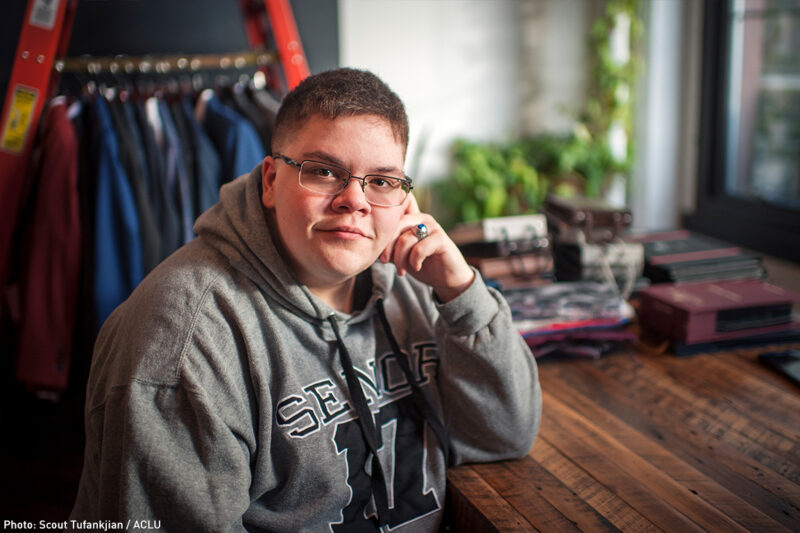
A federal appeals court weighed in yesterday in the nationโs ongoing conversation about restrooms and transgender people, ruling squarely in favor of transgender people and equality.
Gavin Grimm is a junior in high school in Gloucester, Virginia. Heโs a boy, but because heโs also transgender, his school told him he couldnโt use the boyโs restroom at school, but would have to use the girlโs room or single-user restrooms. Gavin didnโt think it was right for him to be treated differently than all the other boys at his school, so (with the ภฯฐฤรลฟชฝฑฝแน๛โs help) he challenged the districtโs rule as discriminatory.
Yesterday, the United States Court of Appeals for the Fourth Circuit . It held that schools that bar students from using gender identity-appropriate restrooms discriminate based on sex in violation of Title IX, a federal law against sex discrimination in education. The court sent the case back to the trial judge for further proceedings.
The ruling is a big deal on many levels. Itโs the first federal appeals court ruling on the issue and backs up the interpretation of Title IX from the federal Education Department, which has been a true leader on this issue.
The decision applies directly to North Carolina and South Carolina, not just Virginia. That means that the requirement in North Carolinaโs recently enacted law, that schools and government buildings force transgender people into the wrong restrooms, is now clearly unlawful sex discrimination that violates federal law. And it should send a strong message to South Carolina, where another anti-transgender bill is being considered, that itโs time to put these harmful measures to bed for good.
Perhaps most importantly, the ruling should mean that Gavin himself โ and so many other transgender people all across the Fourth Circuit and all across the country โ should no longer have to be humiliated by having his very identity disrespected and undermined day after day when he โ like all of us โ has to use the restroom.
We still, though, have some work to do to help educate America about who transgender people are and why the bathroom predator myth is just the extreme rightโs most recent strategy for curbing LGBT equality. Itโs their last ditch effort after they lost the marriage fight. The good news is that the public is catching on. The more people learn that Gavin is in fact just a boy who needs to use the bathroom like his peers, the more these bills will die quietly.
This good news follows another win for transgender students this week. Two days ago, the Tennessee state legislature lay to rest a bill that would have forced transgender students to use the wrong restroom. Pressure from LGBT advocacy groups like the ภฯฐฤรลฟชฝฑฝแน๛ and leadership from transgender students on the ground in Tennessee helped to put the nail in the coffin of that harmful measure (at least for this year). Unfortunately, there is another bill in Tennessee that already passed and is awaiting the governorโs veto or signature in the coming days. The bill would allow therapists to turn gay and transgender patients away with claims that treating them would violate their religious beliefs. A similar but perhaps even more threatening measure in Missouri would enshrine in the stateโs constitution the right to discriminate against same-sex couples and turn them away from wedding services in the name of religion. These states should look to the economic fallout in Mississippi and North Carolina as a warning about what could happen if they ram these bills through.
All in all, itโs been a roller coaster of a ride for LGBT rights recently. Weโve seen some big wins and big losses these past few weeks, and weโre likely to see yet more in the weeks to come. What we know for sure is that the moral arc does indeed bend towards justice, and we will continue to fight with all our might until weโve achieved full equality.

